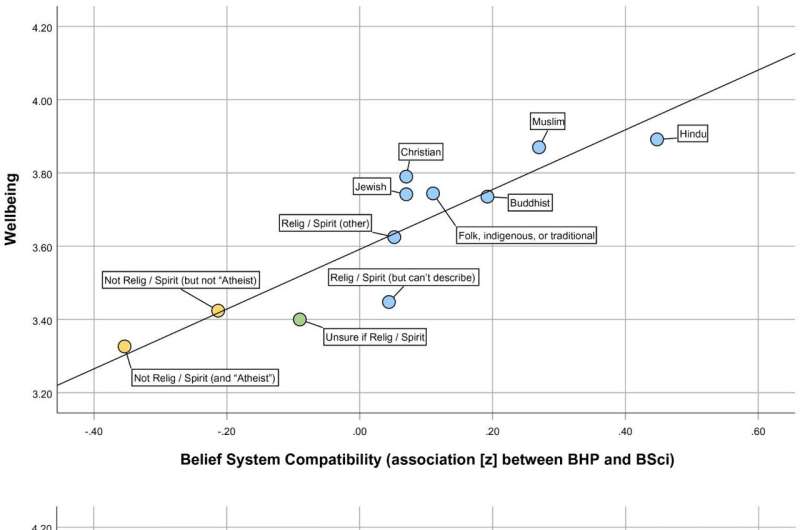A recent study by researchers at Brunel University of London has challenged the common assumption that science and religion are incompatible. The study, which surveyed over 55,000 people from major world religions, atheists, agnostics, and non-religious individuals across 54 countries, found that those who hold both scientific and spiritual beliefs tend to have higher levels of life satisfaction and overall well-being. This suggests that the perceived clash between science and religion may be more of a Western phenomenon, with many non-Western cultures finding a harmonious coexistence between the two. The findings have important implications for public health and well-being, as they suggest that easing the tension between science and religion could lead to happier and healthier communities. Well-being Religion

Bridging the Gap between Science and Spirituality
The study, published in the journal Religion, Brain & Behaviour, challenges the commonly held belief that science and religion are inherently incompatible. Traditionally, in Western countries, the strong scientific tradition, particularly in fields like evolutionary theory and Big Bang cosmology, has often been seen as conflicting with the creation stories found in the Bible. This tension has led to a perceived clash between the two belief systems.
However, the researchers found that in many non-Western countries, especially in Asia and Africa, people often find their religious and scientific beliefs coexisting peacefully side by side. This ability to reconcile the two belief systems is linked to greater optimism, a stronger sense of purpose, and overall higher well-being. As Dr. Michael Price, the lead psychologist on the study, notes, “For many people, religion gives them a sense of hopefulness and optimism—some purpose and meaning. It’s not about understanding the origins of the universe or human evolution.”
The Power of Belief System Compatibility
The study’s findings suggest that the perceived clash between science and religion is primarily a Western phenomenon. Across many non-Western countries, people tend to find their religious and scientific beliefs coexisting harmoniously. This “belief system compatibility” is a key factor in determining an individual’s well-being.
The researchers found that religious belief, measured in terms of “belief in a higher plan,” is more strongly linked to good well-being than scientific beliefs, across all countries studied. However, the biggest boost to happiness and health comes from believing in both science and religion. This is particularly true for individuals who identify as Hindu, Muslim, or live in Asian countries.
As Dr. Price explains, “Both of these are really core aspects of psychological mental health, which is itself a massive predictor of physical health.” The study’s findings suggest that easing the tension between science and religion could have significant implications for public health and well-being, potentially leading to happier and healthier communities.
Implications for Mental Health and Public Health
The study’s findings could have far-reaching implications for mental health and public health initiatives. Depression is one of the biggest public health problems worldwide, and the researchers suggest that we may have much to learn from cultures where science and faith coexist more harmoniously.
By recognizing the potential benefits of belief system compatibility, policymakers and healthcare providers could explore ways to foster a more integrated understanding of science and religion. This could involve educational initiatives that emphasize the complementary nature of these belief systems, or the development of mental health interventions that incorporate both scientific and spiritual approaches.
As Dr. Price notes, “In public health and well-being, these results could have significant implications. Easing the tension between science and religion could make communities happier and healthier.” By embracing the coexistence of science and spirituality, we may unlock new pathways to improved mental and physical well-being for individuals and communities around the world.
